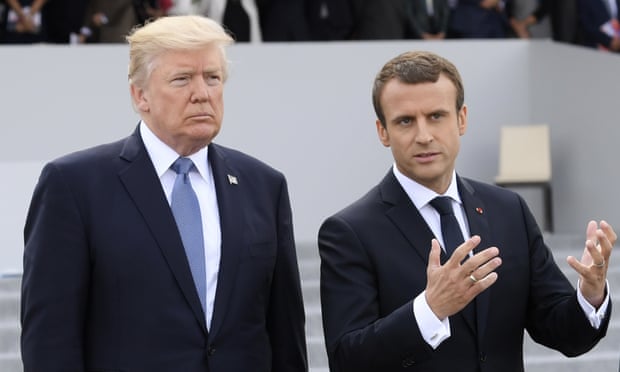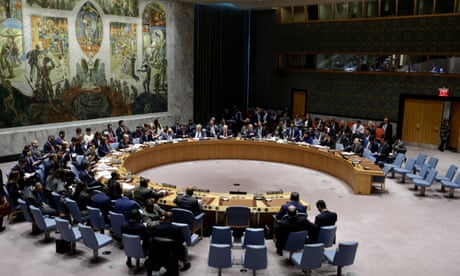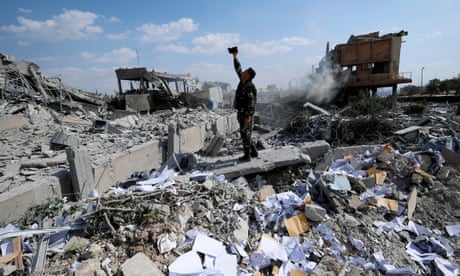French president claims he guided response to Douma chemical attack after ‘things got a little carried away over tweets’
Reuters
Sun 15 Apr 2018 19.35 EDT

Emmanuel Macron says he brought Donald Trump round to his way of thinking on Syria. Photograph: Christophe Archambault/AP
French president Emmanuel Macron has claimed that he convinced Donald Trump to keep troops in Syria for the long term and limit Saturday’s joint strikes to chemical weapons facilities.

Syria: western allies launch diplomatic offensive in wake of strikes
Macron said in an interview on Sunday that restricting the missile strikes to specific targets was not necessarily Trump’s initial plan. “We also persuaded him that we needed to limit the strikes to chemical weapons [sites], after things got a little carried away over tweets,” he said.
The French president also said: “Ten days ago, President Trump was saying ‘the United States should withdraw from Syria’. We convinced him it was necessary to stay. We convinced him it was necessary to stay for the long term.”
While it is unusual for a French president to present himself as driving US policy on military matters in the Middle East, Macron and Trump have developed a friendly relationship over the past year. Macron invited Trump to Bastille day celebrations last year and will travel to Washington on a state visit this month.
French president Emmanuel Macron has claimed that he convinced Donald Trump to keep troops in Syria for the long term and limit Saturday’s joint strikes to chemical weapons facilities.

Syria: western allies launch diplomatic offensive in wake of strikes
Macron said in an interview on Sunday that restricting the missile strikes to specific targets was not necessarily Trump’s initial plan. “We also persuaded him that we needed to limit the strikes to chemical weapons [sites], after things got a little carried away over tweets,” he said.
The French president also said: “Ten days ago, President Trump was saying ‘the United States should withdraw from Syria’. We convinced him it was necessary to stay. We convinced him it was necessary to stay for the long term.”
While it is unusual for a French president to present himself as driving US policy on military matters in the Middle East, Macron and Trump have developed a friendly relationship over the past year. Macron invited Trump to Bastille day celebrations last year and will travel to Washington on a state visit this month.
Saturday’s strikes on Syria – in which the US, France and Britain launched 105 missiles targeting three chemical weapons facilities in retaliation for a suspected poison gas attack in Douma on 7 April – were the first major military operation since Macron’s election in May last year.

Tomahawk strikes and smouldering ruins – but no real change in Syria
Macron reaffirmed that there was proof of chemical attacks, adding: “We had reached a point where these strikes were necessary to give back the [international] community some credibility.”
He said failing to enforce red lines had led Russian authorities to think “these people from the international community – they are nice, they are weak”. “He [Russian president Vladimir Putin] has understood it’s not the case any more.”
Macron added that Russia, which backs Assad politically and militarily, had paved the way for the Syrian government’s actions. “Of course they are complicit. They have not used chlorine themselves but they have methodically built the international community’s inability to act through diplomatic channels to stop the use of chemical weapons,” he said.
The French president nevertheless said he wanted to engage in dialogue with all parties, including Moscow, in order to find a political solution for Syria. There had been no changes to his planned trip to Russia next month, he said.
Macron had warmer words for Turkey. “With those strikes we have separated the Russians and the Turks on this. The Turks condemned the chemical weapons.”
Macron added that the strikes on Syria had been “perfectly carried out”. “All of our missiles reached their target,” he said.
Macron, criticised by the far-left and far-right and part of the conservatives over the attacks, said France, Britain and the US had “complete international legitimacy to act”.
No comments:
Post a Comment